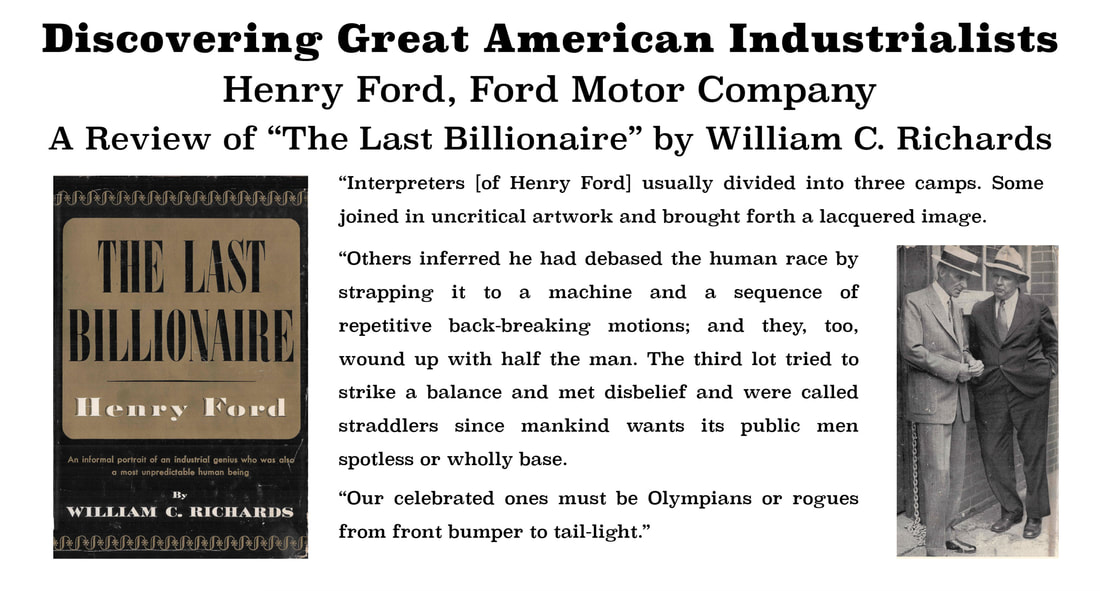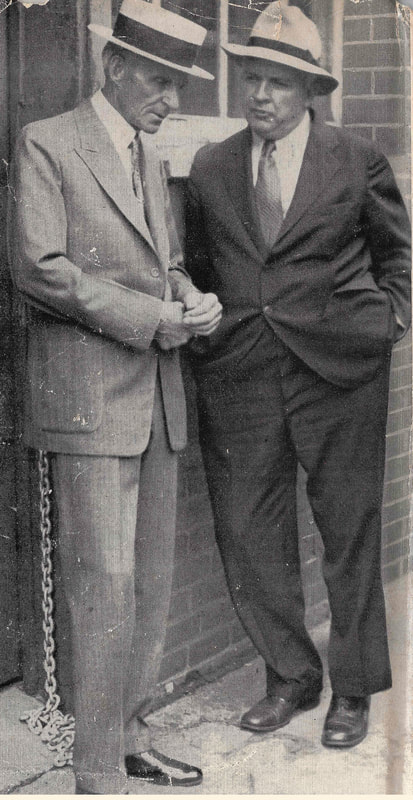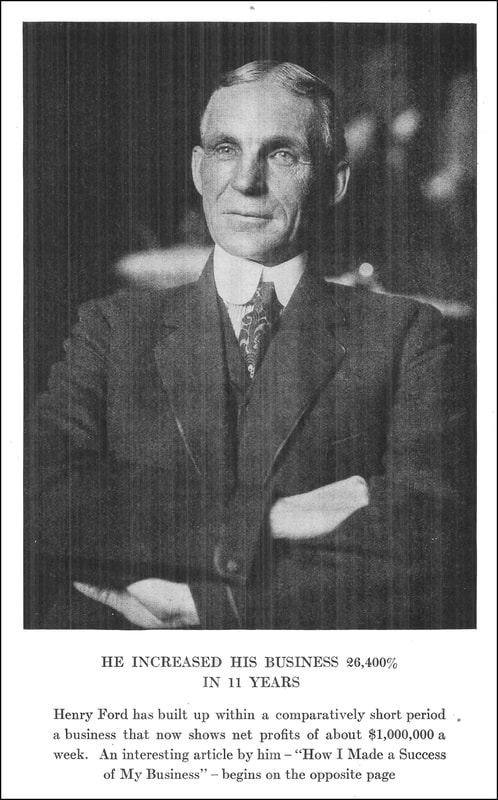A Review of "The Last Billionaire: Henry Ford"
|
|
Date Published: June 29, 2021
Date Modified: June 30, 2024 |
People would have remembered him [Henry Ford] for four qualities:
- One was his belief that there was something holy in work—in this he bordered on fanaticism.
- He always expressed by maxim: "It is always too soon to quit."
- He had the uncluttered imagination of a child and a bit of the attitude of a man who had been born at forty and who had said, "Nothing has happened before I arrived—all life begins here and now.
- The fourth quality was a dynamism that got things done, that brought the spark and drive to the thing he set his mind upon. There were those who ranked Ford as an engineer not far beyond addition, but those about him agreed that when the chips were down he seemed to have the answer. On the idea he poured the warming sun of an exhaustless energy.
William C. Richards, The Last Billionaire
A Review of "The Last Billionaire: Henry Ford" by William C. Richards
- Reviews of the Day: 1948
- Selected Quotes from "The Last Billionaire"
- This Author’s Thoughts and Perceptions
Reviews of the Day: 1948
|
The Last Billionaire probes a paradox. … Richards, former Free Press writer, has done an almost incredible job of what the craft calls straight reporting. … it was written the hard way. He refused to "take an angle." If he had decided to write about "Henry Ford, Saint," he could have been finished in half the time. Ditto if he had taken the other angle.
But he joyfully plunged straight through the middle. William J Coughlin, The Detroit Free Press, February 22, 1948
His [William C. Richard's] book is an understanding one, objective, free of whitewash; in short, it is a fine job of reporting. … He [Ford] launched a bitter paper pogrom against members of the Jewish race and when he recanted some years later [he] insisted that it really wasn't he who was to blame. An unmannerly subordinate or two ran wild without his knowing it. No one ever quite explained how his editors put such a scheme over on the Dearborn Master. It seemed unlikely to Richards.
W. W. Baker, The Kansas City Times, March 1, 1948
|
Henry Ford and
William C. Richards |
Selected Quotes from "The Last Billionaire"
Here are some of my favorite quotes, insights and descriptions of Henry Ford
- Ford was a victim of the reasoning that because a man piles up a vast fortune making a girdle or baking soda or tonic or flivver, the value of what he thinks improves with his net cash worth. Pre-eminence in one field, that is, guarantees capacity in all.
- Ford wanted to be Nostradamus and Cassandra and Joel Kupperman—or people insisted he be—and he allowed himself to pontificate like most men, however unqualified. The difference was that other men did not get headlines; if Mr. Ford said off-handed that he liked deviled crabs or pork chops it was wired and cabled to the world.
- Always in him was the conflict of the autocrat and democrat. It was possible for the one [democrat] to provide the club and course [Ford Club House]; it was impossible for the autocrat to then give the membership carte blanche to use them as it wished. He had to impose don'ts. [referring to drinking, smoking and carousing around]
- The volume of evidence of Ford's willingness to spend on wages is a record of voluntary action. He liked to play Santa Claus but when he put on the red suit and white beard he did so because he wanted to. He never anticipated a day when a valet in the form of a trade union would lay out the suit and beard on the bed, saying,"Henry, put these on," and then force him into them.
- The only adjective continuously true of him was "unpredictable."
And one of my favorite describes how he would ride his newly purchased railroad playing a harmonica.
|
Coal Tender: By Richard H. Bleasdale [Public domain] via Wikimedia Commons
|
This Author’s Thoughts on Henry Ford, William C. Richards, and "The Last Billionaire"
|
This book was published in 1948 shortly after the end of World War II and Henry Ford's death. Mr. Richards closes out his preface that he entitles "An Explanation" with these words:
I like to remember Mr. Ford as the most human gentleman I ever knew. He wrote his name large in his world—and besides the new trails he left, as all men do, an occasional muddy footprint on the carpet. It is a wonderful biography of a most complicated man. It is balanced in its perspective. It does not apologize or attempt to pass over the actions of Henry Ford that many remember him for today. He covers Henry Ford's multi-year attack on the Jewish people in a chapter entitled the "Paper Pogrom" and covers his actions against labor in one chapter entitled "Labor Deals Itself In."
He balances this off later in the book with this comment: |
People who read ulterior significance into Ford's admiration for Germany and insinuated that the same admiration extended to Potsdam and Berchtesgaden, missed the point. He was interested in Germany because of its efficiency, cleanliness, its manufacturing methods and its products, and because he thought Germans as a race worked harder than other people.
These were virtues he believed in. They were, in his book, the most important things in life.
In a wonderful paragraph I think Mr. Richards summarizes one problem that most biographers have and even a problem we have as a society with our very judgmental style on the internet.
Interpreters [authors] usually divided into three camps. Some joined in uncritical art work and brought forth a lacquered image. Others inferred he had debased the human race by strapping it to a machine and a sequence of repetitive back-breaking motions; and they, too, wound up with half the man.
The third lot tried to strike a balance and met disbelief and were called straddlers since mankind wants its public men spotless or wholly base.
Our celebrated ones must be Olympians or rogues from front bumper to tail-light.
This book is a wonderful read into the life of America's first industrialist to grab attention-getting headlines almost every time he took a breath and exhaled. Too many times, the kid in him ran with the opportunity.
A great book from a "straddler."
Cheers,
- Pete
A great book from a "straddler."
Cheers,
- Pete



